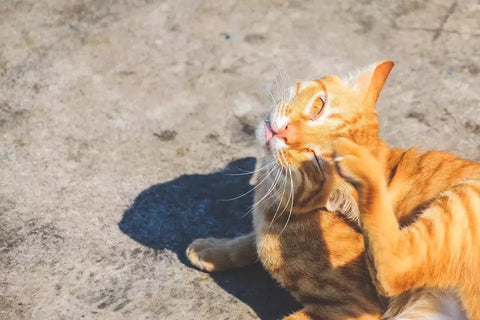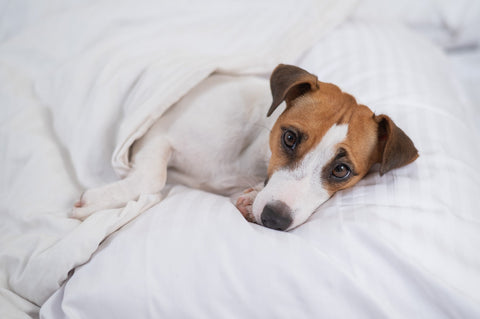As pet parents, we only want what's best for our fur-babies. It is not enough that we only provide them with their basic needs - food, water, shelter. It is also important that in line with their basic needs, we also help them maintain a healthy cat weight or healthy dog weight.
A healthy dog weight and healthy cat weight helps reduce the risks of your fur-babies developing diseases that are linked with being underweight, nutrient deficiencies, obesity, joint problems, and even cancer.
Whether your fur-baby is prone to suddenly (and easily) losing weight, gaining weight or you're making sure that they maintain their current weight, we've come up with everything you need to know in maintaining a healthy weight for your pets, for a healthier and happier life.
Because if you want your dog to stay healthy, it is very important that you begin good practices in your home.
"A healthy dog weight and healthy cat weight helps reduce the risks of your fur-babies developing diseases that are linked with being underweight, nutrient deficiencies, obesity, joint problems, and even cancer."
What's the healthy weight for your fur-baby?
Each dog and cat are different and every dog and cat each have their own healthy weight. The best way to know that is to visit your vet (as if we don't know that already). Your vet will be able to tell you the most suitable weight for your fur-baby based on their breed, age, gender, and health condition.
Some dog breeds gain weight faster than others. These breeds include Pugs, Cocker Spaniels, Saint Bernards, Beagles to name a few. Also, according to The Reader’s Digest, female dogs reach puberty and adult weight faster than male dogs. Although they may gain weight quickly, it is equally important to keep them at a healthy dog weight. Canine obesity can be very dangerous for your fur-baby. On the other hand, malnutrition can be just as dangerous, which is why it is so important to keep your pet at a healthy weight.
Is my dog's weight healthy?
As mentioned above, your veterinarian is the best person that can assess if your pet's weight needs gaining or losing. Your vet can teach you some ways in identifying if your dog's weight is healthy. A dog losing weight can be just as dangerous as an obese dog, so be sure to constantly monitor your dog’s weight and body.
Some of these ways include observing the shape of your dog's body and feeling some body parts especially their ribs through a rib examination. To do this, try pressing your dog's sides and feeling their ribs. Because as you see, your fur-baby's weight is not just about that weighing scale, it's more of a healthy and balanced body structure and composition. A dog weight calculator for your breed should help you to see if your dog needs to gain weight or lose weight as well.
Moreover, Hills Pet recommended that to know if your fur-baby is obese, no matter what your dog's breed is, you should be able to feel all of your dog's ribs without a thick layer of fat covering them. Your dog's chest should also be wider than their abdomen, with a noticeable tuck-up from their chest to their stomach. In general, an overweight dog will have no defined waist and no distinction between their chest and stomach. You may also notice that your dog will pant when walking, walk a bit slower than before, or nap more frequently.
What is a healthy weight for a cat?
Maintaining a healthy cat weight is key to keeping your cat mobile and feeling its best. But what is a healthy weight for a cat? Generally, the average house cat weight is roughly ten pounds. Although there is much less variation in size from dogs, a healthy cat weight will still depend on the breed and activity level of your fur-baby. A cat weight chart can be used to give you an idea if your cat is overweight or underweight, but a veterinarian will be able to give you a more decisive answer.
Cat food bags or cans will have general guidelines on how much to feed a cat. However, it is important to remember that this is a general suggestion. How much to feed a cat will depend on if your cat’s body condition is ideal. You should be able to see your cat’s waist when they are at a healthy weight. How much to feed a cat and what type of diet works best for your cat can be planned with your veterinarian to make sure that your cat is at a healthy weight.

What should you do?
Always keep in touch with your vet. Your veterinarian is your helping hand in maintaining a healthy weight for pets. Be honest and tell them your dog's medical history, diseases, habits, allergies, etc. Your vet will give you information on how to help a dog lose weight in a healthy fashion or give you the best dog food for gaining weight that fits your dog’s specific needs.
The same goes for cats! Be sure to mention any foods your pet eats as well as realistic daily exercise. By doing so, your vet will be able to assess your pet's ideal weight and provide you with a proper diet and healthier lifestyle for your fur-baby.
Develop good feeding habits. Superb eating practices for your fur-baby greatly relies on you. Remember to feed them in the same place, with the same feeding station, at the same time every day so their body will adjust to that mealtime. Feeding the proper amount of quality food consistently is one of the most important aspects of maintaining a healthy cat weight or dog weight. How much food to feed your dog can be adjusted for an ideal weight. While a healthy cat weight will generally fluctuate much less than dog’s, you will still need to ensure that you know how much to feed a cat for the proper body weight.
If your pet is underweight, you will need to know how to make a dog gain weight or how to put weight on a cat through feeding. While sometimes it can be as simple as adding more food to each meal to make a dog gain weight, it can often require more. Cats and dogs can both benefit from a vet recommended high calorie food if they need to put on weight. A dog food for weight gain will differ from a healthy weight dog food in serving size as well as nutritional benefits.
Don’t give in to begging. Yes, we know. Those adorable puppy dog eyes are just too cute! And the kitty purrs will make you want to share. But resist the temptation! Don’t give in when your fur-baby is begging for food and treats if it is not a part of your pet’s diet. This way you can control what they're eating so that they stay on-track with their weight. If you struggle with this, consult your vet for healthy treats that you can share with your fur-baby who is trying to lose weight. Avoiding table scraps and treats is a simple way how to help a dog lose weight.
Offer only nutritious and healthy foods. Eliminate table scraps and high-calorie treats. Instead, give your dog smaller but more frequent feedings of whole foods, proteins, fiber, and jam-packed nutrient foods.
You can give your dog Pet Parents® Multifunctional SoftSupps® as a substitute snack that is actually healthy for your dog. The high- quality multivitamins from Pet Parents® can help provide the extra support for healthy bodily functions and development of your fur-baby for a fun-filled, active life.
These supplements contain fish oil, glucosamine & chondroitin, enzyme & probiotic blend, and a variety of vitamins that promotes skin & coat health, hip & joint health, proper digestion, and healthy heart & immune function.
Additionally, you can consider Pet Parents® Probiotic SoftSupps® for dogs that will provide your fur-baby with valuable nutrients that can help support their immune & digestive health and help promote intestinal well-being. These dog supplements also play a great role in assisting in the digestion & absorption of essential nutrients.
The supplements contain MS-99® which is a clinically-studied form of Bacillus coagulans that aids in maintaining your fur-baby's gut flora in their digestive tract and offers an exceptional source of beneficial intestinal bacteria for your dog. Pet Parents® Probiotic SoftSupps® also consist of our powerful 5-strain probiotic blend (5 B CFU) that promotes proper digestion and absorption of essential nutrients.
Commit. Make a commitment (include your family members, too) to follow the prescribed diet and lifestyle for your fur-baby. Remind them the do's and don'ts if they are gaining, losing, or maintaining their current weight. Remind your family members that there are many other beautiful ways (other than food) to show and communicate their affection for your dog and cat, like cuddles, playtime, and pet enrichment!
Exercise. Encourage your dogs and cats to keep moving. All dogs, not just an obese dog, need exercise and stimulation for both their mental and physical health. When your fur-baby get larger as days pass by, it can be difficult for pet parents to notice at all, leading to what the Association for Pet Obesity Prevention calls a the "fat pet gap." One thing that can help combat (and prevent) this is regular exercise. Like dogs, cats also need exercise to prevent boredom and stay healthy. Play with your cat to help provide exercise and bond with them.
Keep to scheduled exercise regimens and do your best to find something your fur-baby enjoys. Exercises should not necessarily be rigid and complicated, a walk to the park every day or playtimes (like playing fetch) are enough for an exercise. You may have to start slow if your dog or cat is obese or very underweight to help them build strength. Exercise is key in how to help a cat lose weight as well as dogs. You'll not only see an improvement in your dog or cat’s weight, but in their mind as well. What’s even better? You and your fur-baby can exercise together, too!
"Quality multivitamins from Pet Parents® can help provide the extra support for healthy bodily functions and development of your fur-baby for a fun-filled, active life."
Maintaining healthy weight for pets gives your fur-baby the best chance of living a healthier, happier, and longer life ahead. Be sure to give the proper nutrition, exercise, and lifestyle for a healthy cat weight and healthy dog weight. How much to feed a cat and how much to feed a dog should be determined in order to help your fur-baby achieve and maintain their ideal weight. As the pet parent, you are in charge your dog losing weight or gaining weight to reach their ideal health. And the same goes for cats! If your fur-baby is obese, make sure you know how to help a cat lose weight and how to help a dog lose weight so that they can return to their healthy lifestyle.









